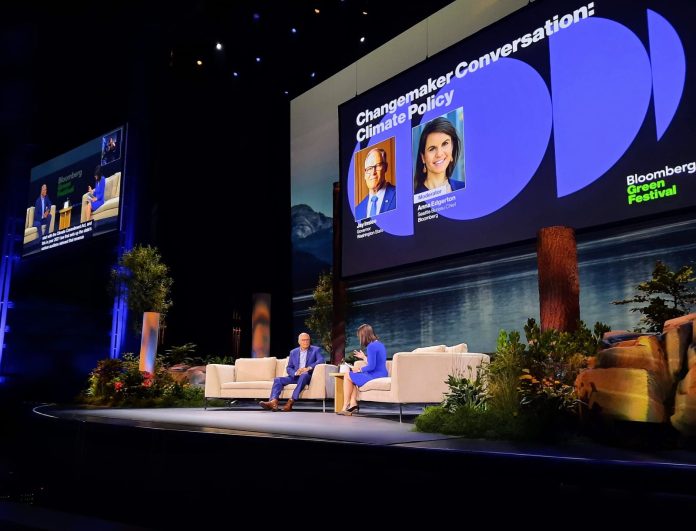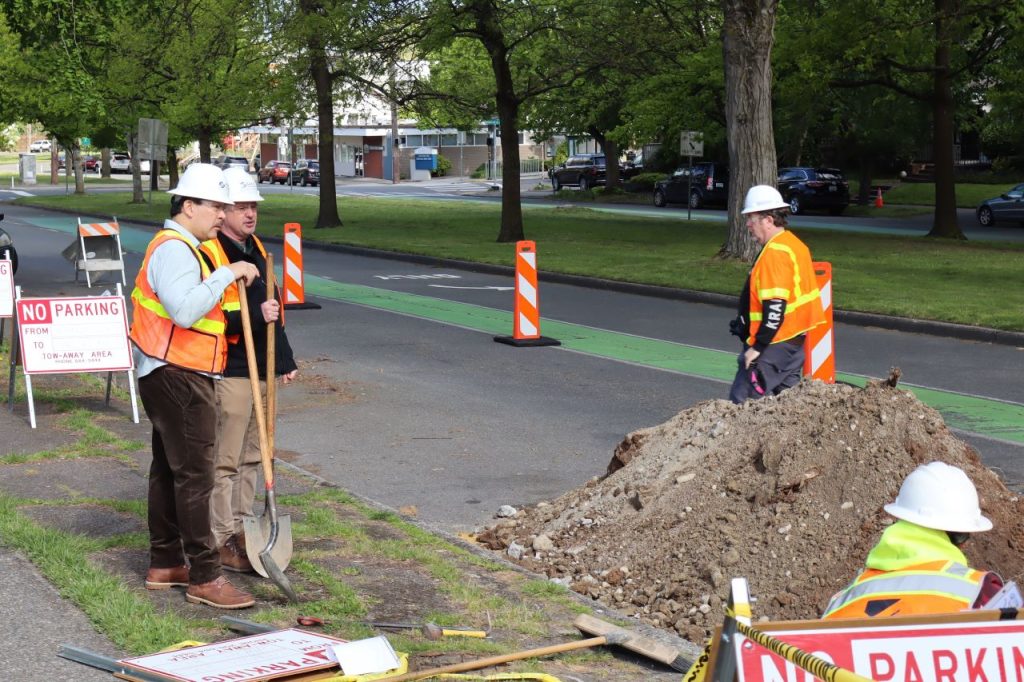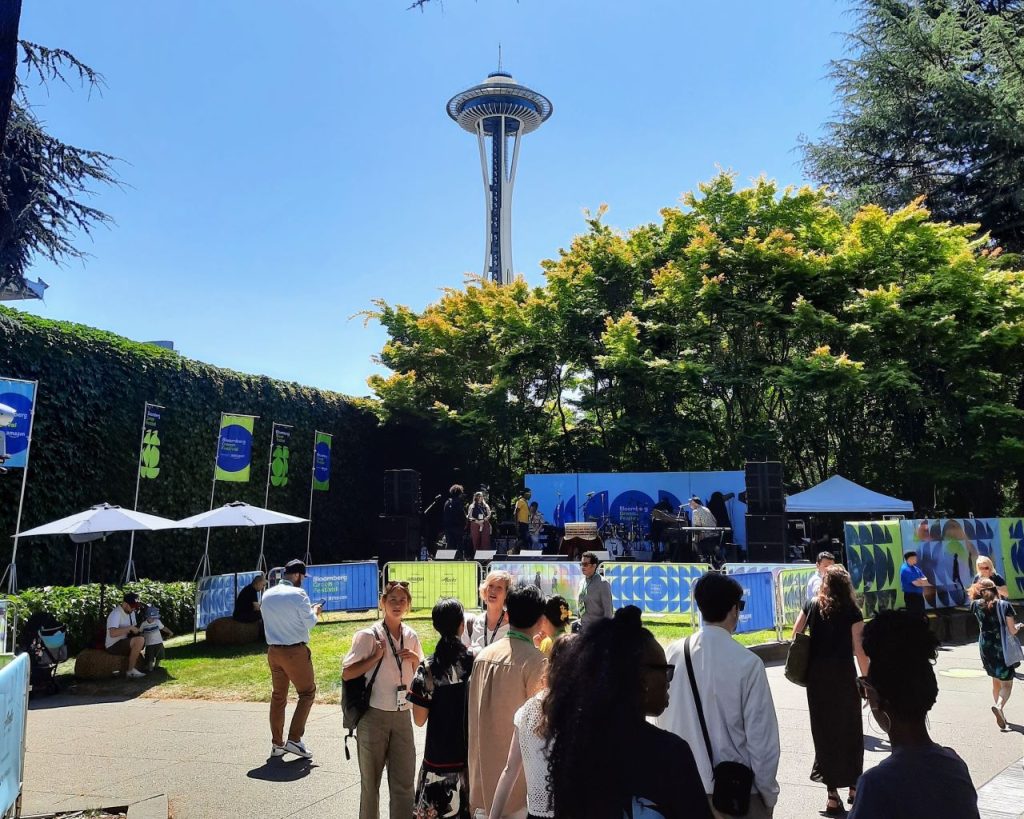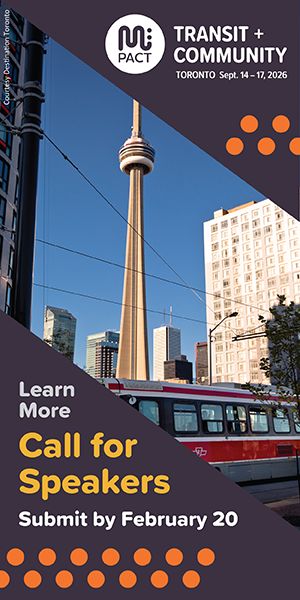
Seattle Mayor Bruce Harrell and Washington Governor Jay Inslee did their best to project local leadership on environmental issues as corporate and public sector leaders gathered this week in Seattle for the Bloomberg Green Festival, a climate conference hosted by Bloomberg Live. Harrell glossed over the snags that his climate agenda has encountered, emphasizing his ratcheting up of green building mandates, tree canopy, and expansion of bike lanes, though these initiatives have faced challenges and their share of criticism.
For his part, Inslee, stressed the the Republican-billionaire-funded ballot initiative seeking to repeal of his signature environmental win: the cap and trade carbon pricing system established with the Climate Commitment Act. Leaving office at the end of the year after 12 years leading state government, the governor portrayed that “cap and invest” system as a model to emulate for other states and nations, as it drives down climate pollution while funding green infrastructure.
“We do not intend to surrender to a pollution blanket that allows the special interests to rip us off and then burn us up,” Inslee said, urging Washingtonians to vote against Initiative 2117. “[The Climate Commitment Act] has worked in our state,” Inslee said. “We would recommend this everyone does this, because it’s work really effectively in reducing pollution and helping families through this transition. So it’s been very successful program.”
A former presidential candidate himself, Inslee stood by President Joe Biden, refusing to take the bait when repeatedly asked if the climate movement and the Democratic party needed a stronger standard bearer in order to defeat climate denier Donald Trump, who Inslee painted as an absolute threat. Polls have shown Biden trailing in battleground states after a shaky debate performance that have reignited questions about his age and cognitive fitness.
“I’d say [Biden’s] done some great work on climate change,” Inslee said. “I know there’s questions, but again, I want to focus on beating Donald Trump.”
Decongestion pricing and Harrell’s low-pollution neighborhoods
Bloomberg staff moderators noted that Seattle has been a close partner with the philanthropic organization headed by Mike Bloomberg, billionaire finance mogul and former mayor of New York City. Seattle is a C40 city, a Bloomberg-funded organization of major cities partnering on climate and adaption work.

One of the ways that partnership has shown up is a $2.5 million grant Bloomberg Philanthropies awarded Seattle in 2018 under then-Mayor Jenny Durkan. A portion of the grant funded a study of a cordon tolling system aimed at decongesting downtown streets and promoting low-pollution transportation options. While the City released that study in 2019, it largely sat on a shelf, and Durkan announced in 2021 she was pivoting away from decongestion pricing and toward a vehicle electrification plan.
Decongestion pricing has also proved elusive for New York City, with Bloomberg unable to implement the policy during his three terms as mayor and unable to prevent New York Governor Kathy Hochul from blocking a subsequent pricing rollout that had been set to go into effect last month. Without New York taking the leap, no other American cities have cleared the hurdle, either. The topic of congestion pricing, however, did not come up during Thursday’s speeches.

Moderator Antha Williams, who is environmental program lead at Bloomberg Philanthropies, did ask Mayor Harrell a question about his plan to implement low-pollution neighborhoods. The plan remains a loose sketch, and Harrell’s response did not add key details, such as where and when the program would be implemented and what exactly the approach would be driving down car pollution — particularly in the absence of decongestion pricing or broad pedestrianization plans to reduce space for cars. Decongestion tolls are a proven solution to cut pollution; London cut nitrogen oxide pollution in half by creating an “ultra-low emission zone” within Inner London.
“I issued, in 2022, a transportation climate justice executive order, and in that we will demonstrate in these certain areas through objective criteria,” Harrell said. “We’re going to focus looking more tree canopy, more protected bike lanes. Looking at where we have areas that get incredibly hot, how can I get some of our own assets, like community centers, and turn them into resiliency hubs. So, it was very focused approach, neighborhood by neighborhood, on creating our programs.”
Mayor Harrell cited his work to add bike lanes, which is big turn from how he campaigned in 2021, when he made a point to say he would not lead with bikes.
— The Urbanist (@UrbanistOrg) July 11, 2024
Harrell's levy proposes 10 miles of new protected bike lanes while the last levy pledged 50 miles. https://t.co/lTJe4Xsbi3
Harrell seemed to indicate that his transportation levy would advance that low-pollution neighborhood work, although it’s not necessarily baked into the proposal, which is largely focused on road and bridge maintenance. The Mayor’s levy proposal promises 10 miles of additional protected bike lanes, compared to 50 miles pledged in the last levy passed in 2015. The levy does include funding to improve barriers on existing protected bike lanes, many of which rely on flimsy flexposts, and did allocate $29 million for tree planting.
“A couple of days ago, I announced we’re putting out a transportation levy that will be $1.55 billion that is laden with climate work and transportation work and the tree planting and canopy developments, and everything you want in a beautiful planet,” Harrell told Bloomberg festivalgoers. “I want protected bike lanes as an example. I had a bike advocate lobby in on that; I said, ‘Oh, you’re gonna be very pleased with this package.’ So, we’re creating these neighborhoods…”
Inslee touts Climate Commitment Act and green job creation
Meanwhile, Governor Inslee talked up his state’s green jobs sector during his slot in the program Thursday afternoon.
“This is the greatest job creating opportunity we have,” Inslee said. “I can’t throw a rock without hitting a clean energy company and the jobs that have been creating.”
Inslee rattled off a list of innovative products that Washington-based companies were working on from advanced silicone batteries to green aerospace fuel.
“Innovation in our state is really leading the nation frankly,” Inslee added. “You just can’t overstate the amount of job creation that is going on. So, this is a pocketbook issue with folks. But when you ask, how we’re gonna get folks to buy into this, because basically, we all share something, which is a sense of morality. This is a moral issue. It’s not just an economic one, it is a moral issue, because it is a commitment to our children.”
Climate investments could be designed in such a way to tackle other persistent societal problems like structural racism, unequal access to opportunity, and poverty. Harrell hit on the theme, arguing climate work could help overcome racial divisions.
“And here in Seattle, I’m so proud that we’re doing a lot of these kinds of things here. And quite frankly, mayors get stuff done,” Harrell said. “And so in this work we’re doing we’re doing, we’re invested, I will lead the way. And I like I said, I certainly dealt with it, on behalf of the African American Mayor’s Association, the Asian American Mayor’s Association. I’ll be the Eskimo if I have to be an Eskimo Association, because this country continues to be obsessed with race. And we’re talking past each other. And climate work could be the biggest unifying element in this country and in this world.”
While mayors and governors can do a great deal, Inslee also alluded to the need for more federal leadership on curbing transportation emissions, and the risk that returning Trump to the Whitehouse has send us backward — Trump weakened vehicle emission standards in his previous term. While Biden’s landmark infrastructure bill funded electric vehicle (EV) charging infrastructure, Republicans would likely be inclined to roll that back, if in power, and a Republican-dominated Congress and Supreme Court could be poised to undermine or invalidate state programs, like the clean fuel standard Washington and other states have passed.
“We need some additional help in the transportation sector,” Inslee sad. “We have a clean fuel standard, but we need the federal government to move forward to allow us to adopt a clean car standard along with California. I mentioned this lease program that I recommend to people, where you get low-income people access to electric vehicles. We’re doing very well on this, we had almost one in five cars this last year to be EVs, but we want to expand and accelerate that program.”
During Inslee’s tenure, Washington has been less successful in at promoting housing density through land use reforms. This could offer some of the biggest opportunities to reduce transportation emissions by encouraging more compact communities that make it easier to get around without a car and scale up transit service. For the past two legislative sessions, a transit-oriented development bill that would have lowered barriers to adding midrise buildings near light rail and bus rapid transit stations has failed to advance at the legislature.
At the same time, the legislature has continued to prioritize the expansion of the state highway network over basic maintenance and transit, which will make it harder to reduce Washington’s transportation emissions. In 2023, Inslee proposed hitting the brakes on the long-planned North Spokane Corridor highway project, delaying it by six years, a move the legislature overrode to go full throttle on building Spokane’s newest urban highway.
Balancing the climate message
Generally, the Bloomberg Green Festival celebrated progress and emphasized the business and branding opportunities that climate change presented rather than dwelling on the dire nature of the crisis and the urgent need for large-scale course correction. Meanwhile, global oil production continues to climb, setting new all-time records, even as an overwhelming preponderance of scientific evidence advises going in the opposite direction and rapidly curbing fossil fuel consumption to avert total climate catastrophe. In short, the scientists are telling us that we’re not acting on climate quickly and concertedly enough.
The climate movement certainly needs persuasive and motivating stories, which cannot be all doom and gloom, as several speakers pointed out. However, effective climate action is not likely to be a pure economic and political bonanza, either, and could well entail sacrifice. It’s a delicate needle to thread, and a real challenge for politicians, executives, and policymakers tasked with keeping the reins of government and business pointed toward climate action rather than doom.
Leading climate advocates and innovators descending on Seattle for a major gathering is an unique opportunity to jumpstart progress both locally and globally. Whether our leaders will will seize the opportunity and forge ahead is open question — as is the question of whether voters will hold firm against state ballot initiatives repealing climate programs and oppose climate deniers running at all levels of government, from the top on down.
Doug Trumm is publisher of The Urbanist. An Urbanist writer since 2015, he dreams of pedestrian streets, bus lanes, and a mass-timber building spree to end our housing crisis. He graduated from the Evans School of Public Policy and Governance at the University of Washington in 2019. He lives in Seattle's Fremont neighborhood and loves to explore the city by foot and by bike.


